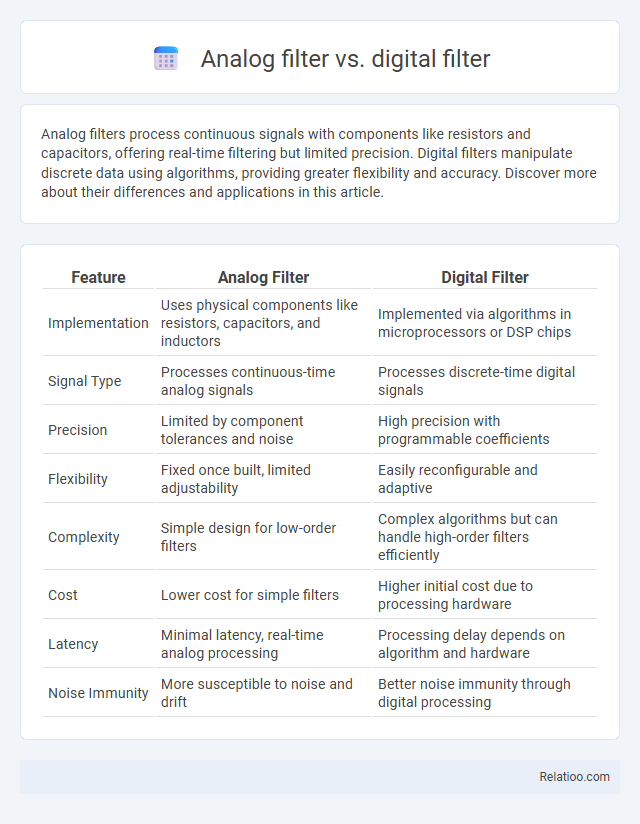Analog filters process continuous signals with components like resistors and capacitors, offering real-time filtering but limited precision. Digital filters manipulate discrete data using algorithms, providing greater flexibility and accuracy. Discover more about their differences and applications in this article.
Table of Comparison
| Feature | Analog Filter | Digital Filter |
|---|---|---|
| Implementation | Uses physical components like resistors, capacitors, and inductors | Implemented via algorithms in microprocessors or DSP chips |
| Signal Type | Processes continuous-time analog signals | Processes discrete-time digital signals |
| Precision | Limited by component tolerances and noise | High precision with programmable coefficients |
| Flexibility | Fixed once built, limited adjustability | Easily reconfigurable and adaptive |
| Complexity | Simple design for low-order filters | Complex algorithms but can handle high-order filters efficiently |
| Cost | Lower cost for simple filters | Higher initial cost due to processing hardware |
| Latency | Minimal latency, real-time analog processing | Processing delay depends on algorithm and hardware |
| Noise Immunity | More susceptible to noise and drift | Better noise immunity through digital processing |
Introduction to Analog and Digital Filters
Analog filters process continuous signals using components like resistors, capacitors, and inductors, offering real-time signal modification with frequency-selective behavior. Digital filters manipulate discrete signals via algorithms, providing precise control, programmability, and flexibility in signal processing tasks. Your choice between analog and digital filters depends on factors such as signal nature, application requirements, and desired filter characteristics.
Fundamental Principles of Analog Filters
Analog filters operate on continuous-time signals using passive components like resistors, capacitors, and inductors to achieve desired frequency responses based on principles of impedance and reactive elements. Your choice between analog and digital filters depends on factors like signal type, precision, and implementation complexity; analog filters excel in real-time processing with minimal latency. Understanding the fundamental principles of analog filters is essential for applications requiring smooth, immediate filtering without the need for conversion to discrete signals.
Fundamental Principles of Digital Filters
Digital filters process discrete-time signals using mathematical algorithms based on difference equations, enabling precise control over frequency response and phase characteristics. Unlike analog filters that rely on continuous-time circuit components such as resistors and capacitors, digital filters operate in the digital domain, offering flexibility in implementing complex filtering techniques like FIR (Finite Impulse Response) and IIR (Infinite Impulse Response) structures. Your choice of digital filters allows for adaptive filtering, stability, and reproducibility, fundamental principles that drive modern signal processing applications.
Key Differences Between Analog and Digital Filters
Analog filters use continuous-time signals and components like resistors, capacitors, and inductors to process input signals, producing an output with altered frequency characteristics based on physical circuit designs. Digital filters manipulate discrete-time signals through algorithms implemented via software or digital hardware, offering flexibility in filter design with precise control over filtering parameters and the ability to easily modify filter characteristics. Key differences include analog filters' susceptibility to component tolerances and noise, while digital filters provide higher stability, reproducibility, and advanced filtering techniques such as adaptive and nonlinear filtering.
Advantages of Analog Filters
Analog filters offer superior real-time signal processing with minimal latency, essential for applications requiring immediate response such as audio and radio frequency systems. Their continuous-time operation provides inherent stability and low noise performance, making them ideal for analog domain signals without the need for analog-to-digital conversion. Your choice of analog filters can result in simpler designs with lower power consumption compared to digital filters, which require complex algorithms and digital signal processors.
Advantages of Digital Filters
Digital filters offer precise control over filter characteristics, enabling exact implementation of complex frequency responses unattainable with analog filters. Unlike analog filters, digital filters provide superior stability and reproducibility since their performance is not affected by component tolerances or environmental variations. Moreover, digital filters support adaptive filtering techniques and are easily programmable, facilitating real-time signal processing and flexibility across diverse applications.
Common Applications of Analog Filters
Analog filters are widely used in audio processing, radio frequency (RF) transmission, and sensor signal conditioning due to their real-time processing capability and low latency. These filters excel in applications like noise reduction in analog signals, tuning circuits in wireless communication devices, and shaping frequency responses in analog audio equipment. Your choice of analog filter benefits scenarios requiring continuous-time signal manipulation before digital conversion.
Common Applications of Digital Filters
Digital filters are widely used in audio signal processing, communications, and biomedical engineering due to their precision and adaptability in handling noisy data and complex signal patterns. Unlike analog filters, which rely on continuous-time electrical components, digital filters process discrete-time signals using algorithms that allow easier implementation of complex filtering operations such as adaptive filtering and multi-rate processing. Common digital filter types include Finite Impulse Response (FIR) and Infinite Impulse Response (IIR), each suited for applications like noise reduction, echo cancellation, and image enhancement in various modern technological systems.
Performance Comparison: Analog vs Digital Filters
Analog filters provide continuous-time signal processing with low latency and inherently smooth frequency responses, excelling in high-frequency applications where real-time processing is critical. Digital filters offer greater flexibility, precision, and programmability, enabling complex filter designs with improved stability and repeatability, especially in environments with variable noise or interference. Performance comparisons reveal analog filters maintain superior performance at ultra-high frequencies and low power consumption, while digital filters outperform in adaptive filtering, ease of implementation, and integration with modern digital signal processing systems.
Choosing the Right Filter for Your Needs
Analog filters process continuous signals with components like resistors and capacitors, offering low latency and simplicity ideal for real-time applications. Digital filters use algorithms on sampled data, providing flexibility, precision, and easy implementation of complex filter designs tailored for adaptive and programmable systems. Choosing the right filter depends on factors such as signal type, processing speed, power consumption, and implementation complexity, with analog filters favored in hardware-limited environments and digital filters preferred for advanced signal processing and customization.

Infographic: Analog filter vs Digital filter
 relatioo.com
relatioo.com